2016 October Cisco Official New Released 400-101 Dumps in Lead2pass.com!
100% Free Download! 100% Pass Guaranteed!
400-101 easy pass guide: Preparing for Cisco 400-101 exam is really a tough task to accomplish. However, Lead2pass delivers the most comprehensive braindumps, covering each and every aspect of 400-101 exam curriculum.
Following questions and answers are all new published by Cisco Official Exam Center: http://www.lead2pass.com/400-101.html
QUESTION 326
As a best practice, when a router is configured as an EIGRP Stub, which routes should be received from its distribution neighbor?
A. the default route
B. static routes
C. internal routes only
D. internal and external routes
Answer: A
QUESTION 327
Which BGP feature allows BGP routing tables to be refreshed without impacting established BGP sessions?
A. BGP synchronization
B. soft reconfiguration
C. confederations
D. hard reset
Answer: B
QUESTION 328
Which two options describe two functions of a neighbor solicitation message? (Choose two.)
A. It requests the link-layer address of the target.
B. It provides its own link-layer address to the target.
C. It requests the site-local address of the target.
D. It provides its own site-local address to the target.
E. It requests the admin-local address of the target.
F. It provides its own admin-local address to the target.
Answer: AB
QUESTION 329
Which three options are three of the default EIGRP administrative distances? (Choose three.)
A. Internal, 90
B. External, 170
C. Summary, 5
D. Outside Local, 100
E. Inside Local, 180
F. Inside Global, 1
Answer: ABC
QUESTION 330
Refer to the exhibit. Which two statements about this route table are true? (Choose two.) 
A. The BGP routes are internal.
B. The OSPF routes with the E2 flag retain the same metric as they leave the router.
C. The OSPF routes with the IA flag have their administrative distances incremented as they leave the router.
D. The BGP routes are external.
E. The OSPF routes with the E2 flag have their metrics incremented as they leave the router.
Answer: AB
QUESTION 331
Refer to the exhibit. Which two statements about this configuration are true? (Choose two.) 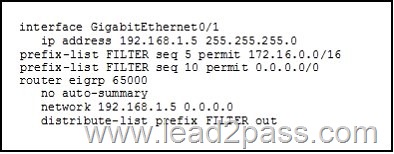
A. It allows 172.16.0.0/16 to be distributed into EIGRP.
B. It allows a default route to be distributed into EIGRP.
C. It allows 172.16.0.0/16 and larger subnets to be distributed into EIGRP.
D. It prevents 172.16.0.0/16 from being distributed into EIGRP.
E. It prevents a default route from being distributed into EIGRP.
F. It creates summary routes and injects them into EIGRP.
Answer: AB
QUESTION 332
Refer to the exhibit. R1 is able to reach only some of the subnets that R2 is advertising.
Which two configuration changes can you make to ensure that R1 can reach all routes from R2? (Choose two.) 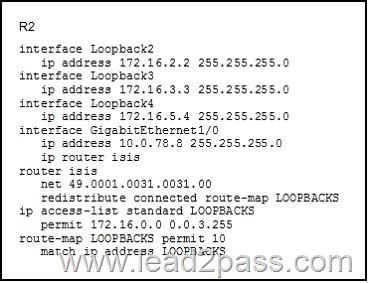
A. Add an additional permit statement to the LOOPBACKS route map.
B. Modify the LOOPBACKS access list to include all loopback subnets.
C. Add an additional statement in the LOOPBACKS route map to match both Level 1 and Level 2 circuits.
D. Add an additional statement in the LOOPBACKS route map to match the R1 CLNS address.
E. Configure the interfaces between R1 and R2 with a Level 1 IS-IS circuit.
F. Configure the interfaces between R1 and R2 with a Level 2 IS-IS circuit.
Answer: AB
QUESTION 333
Refer to the exhibit. R1, R2, and R3 have full network connectivity to each other, but R2 prefers the path through R3 to reach network 172.17.1.0/24. Which two actions can you take so that R2 prefers the path through R1 to reach 172.17.1.0/24? (Choose two.) 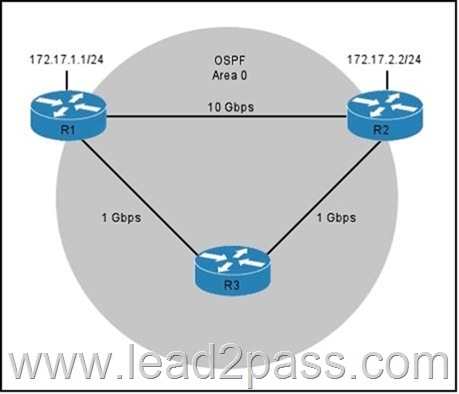
A. Set the reference bandwidth to 10000 on R1, R2, and R3.
B. Configure the cost on the link between R1 and R3 to be greater than 100 Mbps.
C. Set the reference bandwidth on R2 only.
D. Configure a manual bandwidth statement with a value of 1 Gbps on the link between R1 and R3.
E. Modify the cost on the link between R1 and R2 to be greater than 10 Gbps.
F. Configure a manual bandwidth statement with a value of 100 Mbps on the link between R1 and R2.
Answer: AB
QUESTION 334
What are two advantages to using Asynchronous mode instead of Demand mode for BFD? (Choose two.)
A. Asynchronous mode requires half as many packets as Demand mode for failure detection.
B. Asynchronous mode can be used in place of the echo function.
C. Asynchronous mode supports a larger number of BFD sessions.
D. Asynchronous mode requires one fourth as many packets as Demand mode for failure detection.
E. Asynchronous mode’s round-trip jitter is less than that of Demand mode.
Answer: AB
QUESTION 335
Which action does route poisoning take that serves as a loop-prevention method?
A. It immediately sends routing updates with an unreachable metric to all devices.
B. It immediately sends routing updates with a metric of 255 to all devices.
C. It prohibits a router from advertising back onto the interface from which it was learned.
D. It advertises a route with an unreachable metric back onto the interface from which it was learned.
E. It poisons the route by tagging it uniquely within the network.
Answer: A
QUESTION 336
Which two statements about the ipv6 ospf authentication command are true? (Choose two.)
A. The command is required if you implement the IPsec AH header.
B. The command configures an SPI.
C. The command is required if you implement the IPsec TLV.
D. The command can be used in conjunction with the SPI authentication algorithm.
E. The command must be configured under the OSPFv3 process.
Answer: AB
QUESTION 337
Which two statements about SoO checking in EIGRP OTP deployments are true? (Choose two).
A. During the import process, the SoO value in BGP is checked against the SoO value of the site map.
B. During the reception of an EIGRP update, the SoO value in the EIGRP update is checked against the
SoO value of the site map on the ingress interface.
C. At the ingress of the PE/CE link, the SoO in the EIGRP update is checked against the SoO within the
PE/CE routing protocol.
D. At the egress of the PE/CE link, the SoO is checked against the SoO within the PE/CE routing protocol.
E. The SoO is checked at the ingress of the backdoor link.
F. The SoO is checked at the egress of the backdoor link.
Answer: AB
QUESTION 338
Which two OSPF LSA types are flooded within the originating area? (Choose two.)
A. type 1, Router LSA
B. type 2, Network LSA
C. type 3, Network Summary LSA
D. type 4, ASBR Summary LSA
E. type 6, Group Membership LSA
F. type 9, Opaque LSA
Answer: AB
QUESTION 339
Which statement about the OSPF Loop-Free Alternate feature is true?
A. It is supported on routers that are configured with virtual links.
B. It is supported in VRF OSPF instances.
C. It is supported when a traffic engineering tunnel interface is protected.
D. It is supported when traffic can be redirected to a primary neighbor.
Answer: B
QUESTION 340
Refer to the exhibit. ASN 64523 has a multihomed BGP setup to ISP A and ISP B. Which BGP attribute can you set to allow traffic that originates in ASN 64523 to exit the ASN through ISP B? 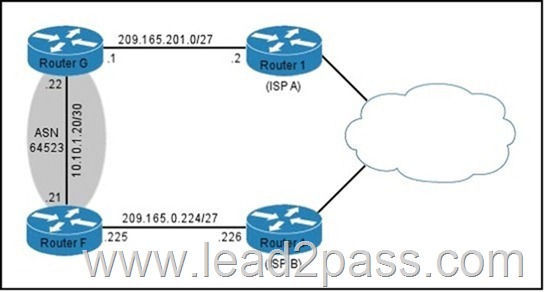
A. origin
B. next-hop
C. weight
D. multi-exit discriminator
Answer: D
QUESTION 341
When deploying redundant route reflectors in BGP, which attribute can you configure on the route reflector to allow routes to be identified as belonging to the same group?
A. ROUTER_ID
B. CLUSTER_ID
C. ORIGINATOR_ID
D. PEER_GROUP
Answer: B
QUESTION 342
Refer to the exhibit. R1 and R2 have a working VRF-Lite configuration, but R1 is receiving a route only to 10.2.2.2 from R2.
Which two changes can you make so that R1 receives all routes from R2? (Choose two.) 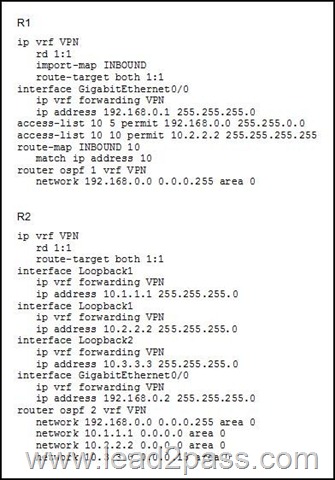
A. Create an additional permit statement in the access list that is referenced by the import-map on R1.
B. Disable VRF filtering on R1.
C. Set the R1 and R2 OSPF process IDs to match.
D. Change the wildcard mask for the network 10.3.3.0 to 0.0.0.0.
E. Create a matching export map in the VRF for R2.
Answer: AB
QUESTION 343
Refer to the exhibit. R2 is unable to access the 172.16.1.0/30 network between R1 and R3. Which option is a possible reason for the failure? 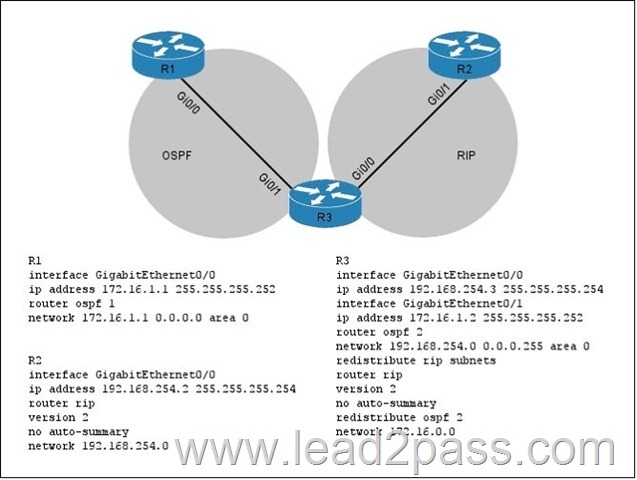
A. The seed metric for redistributing into RIP on R3 is missing.
B. The OSPF processes on R2 and R3 are different.
C. Auto-summary is misconfigured under the RIP process of R3.
D. The subnet mask on the link between R2 and R3 is smaller than /30.
E. The wildcard mask on R3 is misconfigured.
Answer: A
QUESTION 344
Which two options are mandatory components of a multiprotocol BGP VPN-IPv4 address? (Choose two.)
A. a route distinguisher
B. an IPv4 address
C. a route target
D. an MPLS label
E. a system ID
F. an area ID
Answer: AB
QUESTION 345
Which BGP feature enables you to install a backup path in the forwarding table?
A. soft reconfiguration
B. prefix independent convergence
C. route refresh
D. synchronization
Answer: B
QUESTION 346
Refer to the exhibit. Which statement is true about a valid IPv6 address that can be configured on interface tunnel0? 
A. There is not enough information to calculate the IPv6 address.
B. 6to4 tunneling allows you to use any IPv6 address.
C. 2001. 7DCB. 5901. . /128 is a valid IPv6 address.
D. 2002. 7DCB. 5901. . /128 is a valid IPv6 address.
Answer: D
QUESTION 347
Which technology is not necessary to set up a basic MPLS domain?
A. IP addressing
B. an IGP
C. LDP or TDP
D. CEF
E. a VRF
Answer: E
QUESTION 348
What is the main component of Unified MPLS?
A. Multiple IGPs in the network are used, where the loopback IP addresses of the PE routers are
aggregated on the area border routers.
B. Confederations are used to provide scalability.
C. The loopback prefixes from one IGP area are redistributed into BGP without changing the next hop.
D. The ABR is a BGP route reflector and sets next-hop to self for all reflected routes.
Answer: D
QUESTION 349
For which feature is the address family “rtfilter” used?
A. Enhanced Route Refresh
B. MPLS VPN filtering
C. Route Target Constraint
D. Unified MPLS
Answer: C
QUESTION 350
Refer to the exhibit. What does the return code 3 represent in this output? 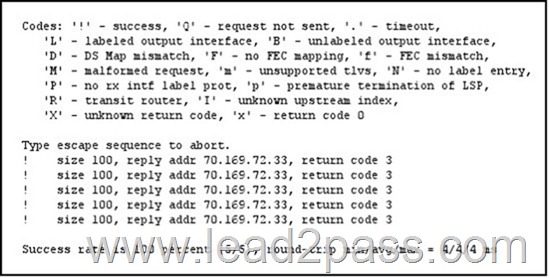
A. The mapping of the replying router for the FEC is different.
B. The packet is label-switched at stack depth.
C. The return code is reserved.
D. The upstream index is unknown.
E. The replying router was the proper egress for the FEC.
Answer: E
Lead2pass provides guarantee of Cisco 400-101 exam because Lead2pass is an authenticated IT certifications site. The 400-101 dump is updated with regular basis and the answers are rechecked of every exam. Good luck in your exam.
400-101 new questions on Google Drive: https://drive.google.com/open?id=0B3Syig5i8gpDU2RjeUlHTTZXb1U
2016 Cisco 400-101 exam dumps (All 1219 Q&As) from Lead2pass:
http://www.lead2pass.com/400-101.html [100% Exam Pass Guaranteed]